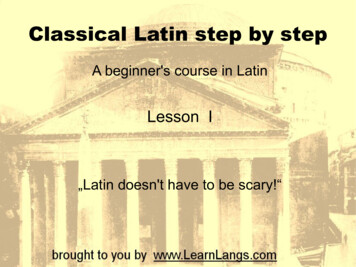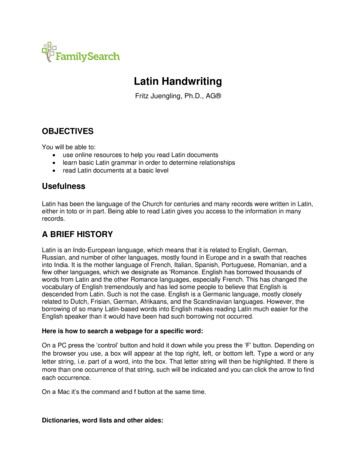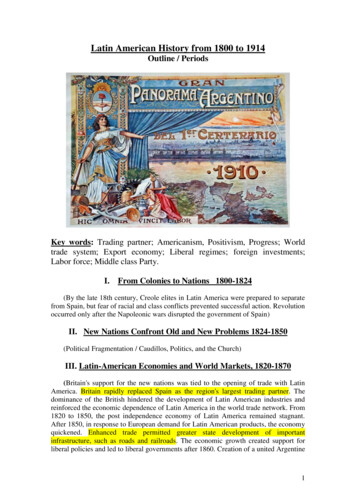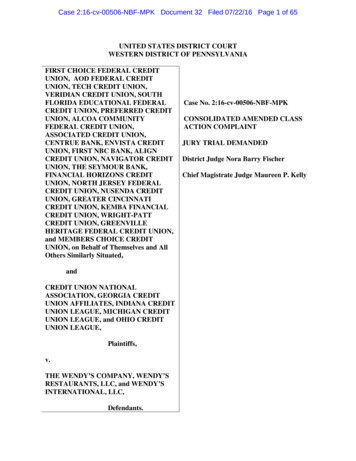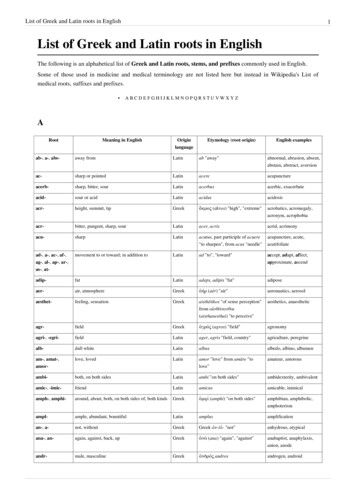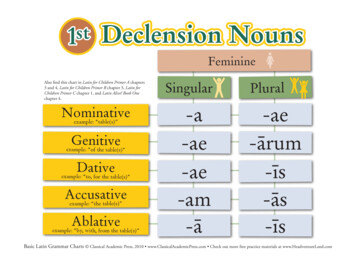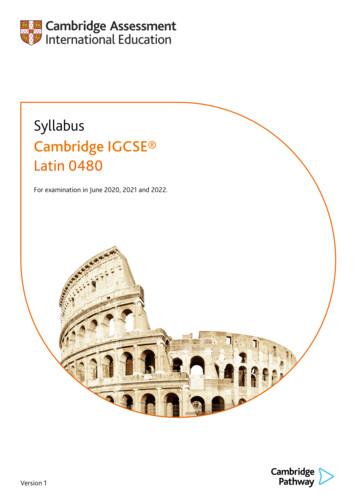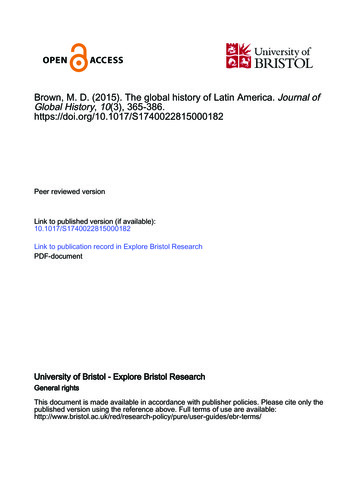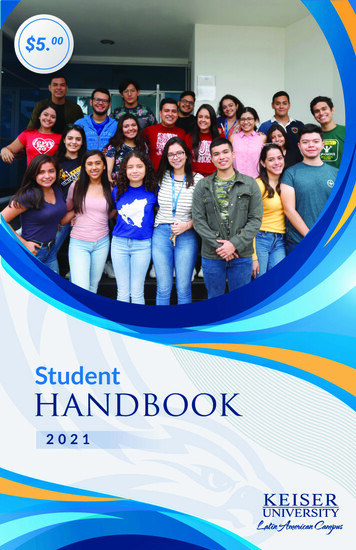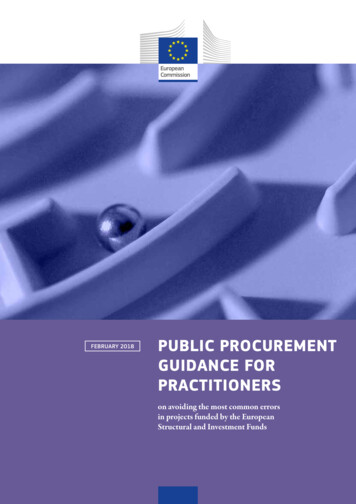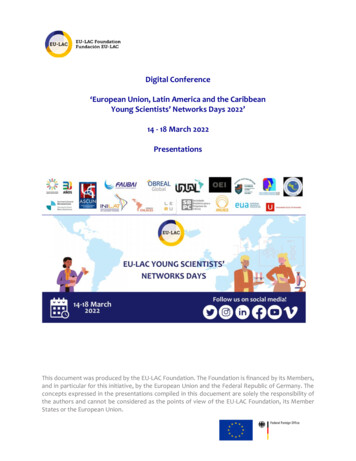
Transcription
Digital Conference‘European Union, Latin America and the CaribbeanYoung Scientists’ Networks Days 2022’14 - 18 March 2022PresentationsThis document was produced by the EU-LAC Foundation. The Foundation is financed by its Members,and in particular for this initiative, by the European Union and the Federal Republic of Germany. Theconcepts expressed in the presentations compiled in this docuement are solely the responsibility ofthe authors and cannot be considered as the points of view of the EU-LAC Foundation, its MemberStates or the European Union.
Programme14 March 202215:30-16:00(CET)Inauguration Sessionooo16:00 - 17:10(CET)Dr Adrián Bonilla – Executive Director, EU-LAC FoundationClaudia Gintersdorfer – Head of Americas Regional Division, European ExternalAction Service (EEAS), representing the EU Co-Presidency of the EU-LACFoundationPablo Grinspun – Ambassador of Argentina to the European Union,representing the PPT CELACThematic Session 1: Gender Perspectives on (Higher) Education and ScienceModeration:oDr Anna Barrera – EU-LAC FoundationPresentations:ooooooMaria Rocío Lazaletta, Leila Zoe Slovacek, María Solange Noblia: Gender(In)Equity in the academic and scientific environment from the recovery ofexperiences as women, research fellows and social workers at the NationalUniversity of Mar del Plata (Universidad Nacional de Mar del Plata)Ana Carolina Brito Menezes: University and motherhood from the perspective ofthe Theory of Subjectivity (Universidade de Brasília)Carolina Giordano Bergmann: Female Deans - Facing male chauvinism in thehighest management position of the Federal Institutes (Universidade Federal deSanta Catarina – UFSC)Rocío Moltoni: Reparation of gender violence in the university space(Universidad Nacional de Rosario; CONICET)Daniel Botero Guzmán: Does Higher Education reduce the gender gap inmathematics? (Universidad Autónoma de Bucaramanga)Kevin Clidoro, Emeka Okoye, Carolina Trichet Paredes: Bridging the Gender Gapin STEM Higher Education through EU-LAC Bilateral Cooperation and the WSTEM Project (Willy Brandt School for public policy at Erfurt University)Comments:oDr Myriam Moïse – Secretary General, Universities Caribbean (UC), VicePresident for International Relations, Université des Antilles1
17:15-18:25(CET)Thematic Session 2: Sustainable Economic Development, Entrepreneurship, andInnovationModeration:oDaniel Lanson – Universidad Nacional de LujánPresentations:oooooooo18:30 - 19:40(CET)Jorge Armando Luna Amador: Analysis of the innovative performance ofcompanies belonging to the service sector in Colombia (Universidad deCartagena)Érica Yaneth Guisao Giraldo: Effect of dynamic capabilities in supply chaininnovation (Universidad de Medellín, Doctoral candidate at EAFIT University)Juan Carlos Urueña Mejía: Networking, its impact on managerial practices andempowerment among women entrepreneurs in Colombia (Universidad delRosario)Claudia Magali Solarte Solarte: Competitiveness pole under the political,economic, social, technological, environmental and legal analysis in the CarchiGuaitara hydrographic basin (Universidad Cesmag)Katty Milena Arrieta Canchila: Global Challenges of the port sector (EscuelaNaval de Cadetes "Almirante Padilla")Keidy Johanna Peláez Higuera: Incidence of institutional policies of HEIs in thegeneration of academic entrepreneurship in an emerging economic context(Universidad de Manizales)Danilo Sorato Oliveira Moreira: The Sustainable Development Goals in thecommunity industry of the Mista Cooperative of producers and extractivists ofRio Iratapuru in Laranjal do Jari (Brazil, Amapá) (Universidad Federal Fluminense– UFF; Instituto Federal do Amapá – IFAP)Comments:Juan Guillermo Hoyos – Secretary General of the Colombian UniversityAssociation (ASCUN), Executive Secretary of the Latin American and CaribbeanSpace for Higher Education (ENLACES)Thematic Session 3: New Technologies and Digitalisation of Scientific ResearchModeration:oMary Carmen Peloche Barrera – Universidad de BarcelonaPresentations:ooMario Fernando Bustillo López: Use of ICT in the teaching and learning processof Organic Chemistry (Universidad Nacional de Cuyo)Carlos Exequiel Garay: Monitoring greenhouse emissions in 5G/6G networks2
oooo(Universidad Nacional de Tucumán)Pablo Jiménez: Quantification of cardiac injuries by means of ArtificialIntelligence techniques (Universidad Nacional de Cuyo)Kevin Morales Chamorro: The future of medical technology against multidrugresistant infections (UNICA, Nicaragua)Natasha Sophie Pereira: Cora Coralina’s Way - Digital Passport for Pilgrims(Universidade Evangélica de Goiás)Sophie Laube Marcelus: From Ayiti Quest to the Metaverse of the Caribbean(Ecole Supérieure d'Infotronique d'Haïti)Comments:oCamilo Carrascal – Manager of the Innovation Centre of OEI in Colombia15 March 202216:00 - 17:10(CET)Thematic Session 4: Public Health (I)Moderation:oDaniel Calbino Pinheiro – Universidade Federal de São João del ReiPresentations:ooooooMaricelly Gómez Vargas: Training in psychology and mental health: the dialogicperspective (Universidad de Antioquia)Edgar Guillermo Pulido Guerrero: Ideas for the mitigation of pandemic-relatedmental health risk in the context of secondary education (Universidad AntonioNariño)David Felipe Vega Villa: Research in Technology and Mental Health in theColombian Caribbean: An introduction (Universidad del Magdalena)Esteban Felipe Flores Romero, Emily Betania Granadillo Castro: Parent educationas a first approach to asthma management in minors: The Asthma Attack Project(Universidad Internacional del Ecuador)Nicolás Torres: Encounters and disencounters of the dis/abled, diverse anddissident bodies with the health system in Colombia (Universidad Nacional deColombia)Gabriela Moreira Lima: Global Challenges: Fake News in times of pandemics(Universidade Federal de São João del Rei)3
Comments:o17:15-18:25(CET)Dr Martha Cordero Oropeza – National Institute of Psychiatry, ResearchProfessor UNAMThematic Session 5: Public Health (II)Moderation:oYenifer Suárez Díaz – Universidad Cooperativa de ColombiaPresentations:oooooLívia da Costa Lemos: Implementation of a center for reception and dentaltrauma care of minorities, women and LGBTQIA population, with a history oforofacial aggression (Unigranrio)Luz Marina Llangarí Arizo: Women sex workers and sexually transmittedinfections: Contributions of the academia to the 2030 Agenda for SustainableDevelopment (Universidad Internacional del Ecuador)Ariadna Feliu: The World Code Against Cancer Framework: Examples from theEuropean Union and Latin America and the Caribbean (International Agency forResearch on Cancer)Daniel Andrés Vargas Tejada: Biobanks: Preserving the scientific heritage ofhumanity (Universidad de Antioquia)Camila Abbondanzieri: South-South Cooperation in Argentina in the context ofthe pandemic: Approaching vaccine donations, technical cooperation, andacademic support as strategies to overcome the health crisis (CONICET)Comments:o18:30-19:40(CET)Dr Andrea Gómez Zavaglia – Head of Centre for Research and Development inFood Cryotechnology (CIDCA-CONICET-UNLP), Principal Researcher at NationalResearch Council, ArgentinaThematic Session 6: Open, Inclusive and Citizen ScienceModeration:oJorge David Bravo Villegas – Escuela Politécnica NacionalPresentations:ooJose Eduardo Leon Rojas: Open and inclusive science during pandemic times: TheCOVID19-EC Group - Your information pill against the coronavirus (UniversidadInternacional del Ecuador)Rocío Bianchi: Open Science and its impact on public policy - MASARE Project4
ooooo(Sustainable Management of Aggregates in Rivers and Reservoirs) (UniversidadNacional de Córdoba)Jorge Alberto López Guzmán: The role of scientific publications in theprivatisation and commercialisation of knowledge generated in Universities(Universidad del Cauca)Fabián Santos: Predicting academic performance through urban-rural gradientsin Ecuador (Universidad Indoamérica)Andrés Valverde Farré: The importance of citizen science and open data sourcesas a model of co-responsibility between academia and citizenship (UniversidadPiloto de Colombia; Universidad Autónoma de Barcelona)Germán Antonio Arboleda Muñoz: Citizen participation in processes oftechnological development and innovation (Universidad del Cauca)Abdullah Dayo: Overcoming the barriers of mobility - Higher Education in the EULAC space (Willy Brandt School for public policy at Erfurt University)Comments:oDr Ignasi Labastida – Chair of the LERU Information and Open Access PolicyGroup, Rector’s Delegate for Open Science at the University of Barcelona16 March 202216:00 - 17:10(CET)Thematic Session 7: Climate, Environment, Natural Resources (I)Moderation:oFrancisco López – Intern, EU-LAC FoundationPresentations:ooooJose Fernando Forero Quintero: The flexibility of electricity grids as a key elementfor the energy transition and the fulfillment of Goal 7 of the SDGs in LatinAmerican and Caribbean countries (Universitat Politècnica de Catalunya)José Gregorio Noroño Sánchez: Renewable energies and the transformation oflabor dynamics in Latin America (Universidad del Sinú)Maria Victoria Longhini: Environmental quality and sunshine in urban enclosuresand facades. Evaluation of solar radiation collection potential in cities(Universidad Nacional de Tucuman Argentina)Sofía Nobili: Bioremediation of soil contaminated with hydrocarbons using localorganic materials and earthworms (Instituto de Desarrollo Tecnológico para la5
oooIndustria Química – CONICET - UNL)Jorge David Bravo Villegas: Development of a methodology to locate theintertropical convergence zone (ITCZ) through post-processing of wind dataobtained from the era interim data archive (Escuela Politécnica Nacional)Pablo de la Vega: The causal effect of external debt on greenhouse gasemissions (Universidad Nacional de La Plata)José Rolando Dupuy Parra: Use of biomass as a renewable source of energy(Centro de Aplicaciones Tecnológicas para el Desarrollo Sostenible)Comments:o17:15-18:25(CET)Dr Félix García Lausín – Coordinator of the Iberoamerican Space of Knowledge,Ibero-American General Secretariat (SEGIB)Thematic Session 8: Climate, Environment, Natural Resources (II)Moderation:oAnna Barrera Vivero – Senior Programme Manager, EU-LAC FoundationPresentations:ooooooRosalia Andrade Medina: Sustainable development of coastal communitiesthrough blue carbon initiatives in the south of Mexico (Centro de Investigacióny de Estudios Avanzados del Instituto Politécnico Nacional)Graziela dos Santos Paulino: Production of active and biodegradable foodpackaging from agricultural wastes (Universidad Federal de Viçosa)Luis Ernesto Núñez González: Biopolymers - Solution to plastic pollution?(Universidad del Valle de Guatemala)Carolina Vargas Vanegas: Providing a fair and efficient mechanism of waterresources based on a cooperative game generating an alternative life for thepeople (Corporación universitaria Minuto de Dios UNIMINUTO)Melisa Jabif: Water conflicts in a pandemic context: Collective construction ofresponses through community infrastructures (Universidad Nacional deTucumán; CONICET)Ricardo Andrés Aladino: The commodification of water as a source of socioenvironmental conflict in Mendoza during December 2019 (UniversidadNacional de Cuyo)Comments:oProf. Daniel Antenucci – Professor of Physiology, Faculty of Exact and NaturalSciences, Independent CONICET Researcher, Director of the Physiological and6
Behavioural Ecology Group, Institute of Marine and Coastal Research18:30-19:40(CET)Thematic Session 9: Epistemology of Science and Research PracticeModerationoDiego Durán Cruz – Programme Manager, EU-LAC FoundationPresentations:oooJonathan Ezequiel Aguirre: Higher Education and the academic profession inArgentina: An interpretative study on the expansion of national graduateeducation in the first decades of the 21st century (Universidad Nacional de Mardel Plata; CONICET)Darby Darwin Gutierrez Guevara: Problems of institutionalism in researchpractice and the behavioural sciences (Centro de Estudios e Investigaciones enAprendizaje y Conocimiento Humano de la Universidad Veracruzana)Romina Rosciano Fantino: Towards a methodology with a gender perspective inresearch in the field of the visual arts in Argentina (Universidad de San PabloTucuman)Comments:oDr Adrián Bonilla – Executive Director, EU-LAC Foundation17 March 202216:00 - 17:10(CET)Thematic Session 10: Learning and Teaching (I)Moderation:oAngie Paola Florez Muñoz – Universidad Nacional de ColombiaPresentations:oooWanessa Do Bomfim Machado: Video lessons in (post)pandemic times: ananalysis of BioSciences professors’ professional identity through their socialrepresentations (Universidade Federal do Rio de Janeiro)Otto Henrique Silva Ferreira: Proposal of constituent elements oftransdisciplinarity in English Language and Musical Language activities(Universidade Estadual de Londrina)James Manuel Pérez Moron: Virtual Experiential Learning-VEL in Business7
ooSchools in Latin America: Case studies and best practices (UniversidadTecnólogica de Bolívar)Jennifer Andrea Venegas Espinoza: Design of inclusive and gender-sensitiveeducational resources developed under a collaborative work logic (Universitatde Barcelona)Pedro Murilo Gonçalves de Freitas: Developing international alternatives ofhands-on learning in Brazilian Higher Education: Topics for a Portuguesehandbook of projects in architectural heritage (Universidade Federal deSergipe)Comments:o17:15-18:25(CET)Dr Adrián Bonilla – Executive Director, EU-LAC FoundationThematic Session 11: Learning and Teaching (II)Moderation:oKarelia Yhomira Mamani Zapata – Universidad Nacional de San AgustínPresentations:oooooAna Milena Morales Sossa: Educational modalities and Higher Education:Towards the construction of a didactic conception (Universidad NacionalAbierta y a Distancia)Sylvana Mariella Valdivia Cañotte: Inverted learning for the current challengesof university education: An analysis based on a literature review (PontificiaUniversidad Católica del Perú)Laura Bibiana Quevedo Padilla: Literature review on the impact ofinternationalisation models of the curriculum in Higher Education Institutions(Universidad Antonio Nariño)Cristian Fernan Muñoz Muñoz: Reflective educational practices and the Burnoutsyndrome in teachers (Corporación Universitaria Minuto de Dios UNIMINUTO)José Antonio Taquía Gutierrez: Stimulation of numerical skills in children withvisual impairments using Image Recognition (Universidad de Lima)Comments:o Prof. Mónica Marquina – Member of the Board of Directors of the NationalCommission on University Evaluation and Accreditation (CONEAU), IndependentCONICET Researcher Argentina, Adjunct Professor of the Faculty of Philosophyand Letters of the University of Buenos Aires in Educational Policy and in chargeof the subject Comparative Education8
18:30-19:40(CET)Thematic Session 12: Agriculture and Food SecurityModeration:oCarolina Torres – Universidad Nacional del Cuyo; CONICETPresentations:oooooSantiago Henao Galeano: Smart Agriculture: Sustainable response to the needsof the fields of Sucre-Colombia (Universidad Pontificia Bolivariana)Diana Beatriz Bravo Benavides: Resilience of agricultural systems (UniversidadTécnica Particular de Loja)Marina Teodoro: The multiplicity of agrochemical patents: Regulatoryperspectives of their use in pesticides and the incidence of cancer in the SãoPatrício Valley (Universidade Evangélica de Goiás)Edithe Rodrigues Neta: The impact of agroecological farmer’s market on the lifeand academic-citizen formation of young growers in the state of Paraíba(Northeast, Brazil) (Universidade Federal da Paraíba)Natalia Restrepo Toro: Women in Food Sovereignty (Corporación UniversitariaMinuto de Dios UNIMINUTO)Comments:oProf. Bernardo Rivera Sánchez – Department of Agricultural Production,University of Caldas, Colombia18 March 202216:00 - 17:10(CET)Thematic Session 13: Culture and Traditional KnowledgeModeration:oRosse Marie Esparza Huamanchumo – Universidad San Ignacio de LoyolaPresentations:oooEdwin Rubio Medina: New ethics of human rights that allows the recognition ofthe subjectivity of non-human entities, especially the sacred places ofindigenous peoples (Universidad del Sinú)Perla Dayana Massó Soler: Cultural governance and cooperation betweencultural capitals in Latin America and Europe (Universitat de Barcelona)Aylén Aviles: The systemic conception of cultural institutions - Museums and9
oooproject dematerialization as a result of the incorporation of new audiences anddigital and analogical territories in pandemic: A review from the concept ofentropy (Universidad Nacional del Litoral)Oriana María Martinelli: First research experiences in the identification oflandscape resources in Huacalera, Quebrada de Humahuaca, World Heritage(Argentina) (Universidad Nacional de Tucumán)Carlos Augusto Conde Gutiérrez: The Impact of the European Regulation 511/2014 on the implementation of the Nagoya Protocol on Access to GeneticResources and Benefit Sharing on the use of Traditional Knowledge of Local,Indigenous and Afro Communities in the framework of the Andean Community(Universidad Externado de Colombia)Joel David Montenegro Lanza: Agenda for intercultural life (Universidad de lasRegiones Autónomas de la Costa Caribe Nicaraguense)Comments:o17:15-18:55(CET)Dr Beatriz Peluffo – Dean of the Faculty of Education Sciences, Universidad de laEmpresa, Coordinator of the Science, Technology and Innovation ReflectionGroup and member of the Vocational Training Group FAP-ALCUEPresentation of Networks and Collaborative ProjectsModeration:oRichar Norman Gómez – Universidad Metropolitana de Ciencias Tecnologías yEducaciónPresentations:oooooooooAurora Lechuga Rodríguez: Network of Young Researchers KairósJosefina Dib / Victoria Guglielmotti / Carolina García Díaz: German-Argentineanlink of young materials researchersDaniel Alejandro Rossit: Iberoamerican Industrial Network 4.0. / RedIberoamericana de Industria 4.0.José Ramón Sabogal Hernández: Erasmus Students Network (ESN)Zully Johana Rodríguez Parra: Society of Doctors and Researchers of Colombia(SoPhl)Carina Diocelyn Meza Ramón: Research Centre for International Affairs(CENTRA)Fernando Gregorio Espinoza: Research Network on Crops of EconomicImportance in Ecuador (REDICIE)Daniela Ruiz Urrea: ‘Semillero’ of literature research: Women and LiteratureJuan José García Rebollo del Río: International Centre for Animal Law and Policy(ICALP)10
ooo19:00-19:45(CET)Daniel Calbino Pinheiro, Gabriela Moreira Moreira Lima: Fake News andPandemic NetworkJavier Rojas Segura – SME Digital Transformation Network - Costa RicaNatalia Restrepo – Higher Education and Gender Equality NetworkDialogue among participants about common interests and possible futurecollaborationsModeration:oDr Anna Barrera – EU-LAC FoundationProposals:o19:45-20:00(CET)Carlos Emilio Orellana Fantoni: Creation of an international dataset collectingthe testimonies of young EU-LAC researchers (Escuela Superior Politécnica delLitoral)Closing SessionoooDr Anna Barrera – Senior Programme Manager, EU-LAC FoundationElizabeth Colucci – European University Association (EUA)Dr Oscar Domínguez González – Executive Director of the ColombianUniversity Association (ASCUN), President of the Board of the Latin Americanand Caribbean Space for Higher Education (ENLACES)11
March 14th, 2022 - Opening SessionThe event began with the words of greeting of Dr Anna Barrera, Senior Programme Coordinator ofthe EU-LAC Foundation, and organiser of the EU-LAC Young Scientists’ Networks Days 2022.Next, Dr Adrián Bonilla, Executive Director of the EU-LAC Foundation, opened the inaugural sessionof the Conference recalling the objective of the event: providing a space for people who are workingas researchers to meet and develop relationships both personally and on behalf of academic networksand civil society. The Executive Director of the Foundation recalled the need to promote newopportunities in relation to academic cooperation between the European Union (EU) and LatinAmerica and the Caribbean (LAC). This, given that one of the main goals of the EU-LAC Foundation isto promote connections between governments, international organisations, and LAC and EUcompanies. Dr Bonilla also stressed that during the Networks Days a space would be promoted whereyoung scientists and their organisations could generate ideas about the future of the EU-LAC commonhigher education space, and where new networks and partnerships between the two regions wouldbe built. Finally, he offered words of thanks to all the organisations that supported the unfolding ofthe conference.Consequently, Claudia Gintersdorfer, Head of the Americas Unit of the European External ActionService, echoed her welcoming remarks, highlighting the importance of education and research tomeet the objectives set out in the common agenda of the EU and LAC, which focuses on a sustainablerecovery, socially inclusive, and where digitalisation has a relevant role. Last June, the EU and LACcountries adopted the Strategic Roadmap 2021-2023 for the implementation of the BrusselsDeclaration and the EU-CELAC Joint Initiative for Research and Innovation (JIRI), which meant animportant step in bi-regional cooperation in an area in which - previously - cooperation was focusedmerely on the bilateral level. Claudia Gintersdorfer also mentioned that the European Union is thedestination of more than a third of LAC students who migrate outside of their region to pursue highereducation studies.Moreover, Claudia Gintersdorfer highlighted that EU research programmes, such as Horizon 2020,have benefited numerous LAC researchers, with contributions to organisations and entities in LACbeing signed for a total of more than 60 million euros. Likewise, the Global Gateway, the Europeaninvestment platform abroad, was recalled, by which the EU will cooperate with Latin America inmatters of sustainable development, green energy, research, digitalisation, among other areas.Finally, some examples of specific projects that the EU has carried out in cooperation with LAC relatedto research, higher education, and digitalisation were mentioned. One of the most important recentprojects is BELLA, the project behind the transatlantic internet network connecting Latin America,through Brazil, with Europe, through Portugal. This project aims to improve connectivity especially forLAC's research and innovation centers, connecting around 12,000 researchers and scientificinstitutions in the regions, and allowing researchers to download data sixty times faster over the next25 years. Another example of cooperation in the scientific field is that of the Copernicus Centers thatare going to be inaugurated in Panama and Chile, which will allow satellite images to be obtained morequickly and efficiently. However, Claudia Gintersdorfer also mentioned the challenges that both12
regions have faced in relation to the impact of the Covid-19 pandemic on education and researchsystems. The LAC region was the one where students lost more days of education due to preventivelockdowns. It is also relevant to note that the region has considerably lower employment rates forwomen and with lower pay than for men. In this way, Claudia Gintersdorfer concluded by highlightingthe importance of investment in education and research, hoping that the conference will constitute asignificant step in the strengthening of cooperation between young scientists from both regions.For his part, Ambassador Pablo Grinspun began his speech by highlighting the importance of the EULAC Foundation in promoting bi-regional dialogue towards the development of the Action Plan of theleaders of both regions. Ambassador Grinspun stressed the relevance of the Young Scientists’Networks Days and encouraged attendees to participate actively during all the days, highlighting thepossibility of creating connections and concrete proposals that will be made in relation to bi-regionalcooperation in research, technology and innovation. He also referred to the JIRI Roadmap– currentlyunderway – through which scientific cooperation between the two regions is promoted, and anambitious bi-regional work plan about education and scientific research has just been approved. Oneof the objectives of this work plan is to promote research to increase the export of services andscientific innovation in LAC. Thus, in order to promote sustainable and socially inclusive developmentthat leaves no one behind, investment in research and development is of vital importance. Finally,Ambassador Grinspun stressed the need for the results of research carried out by young scientists tobe considered by decision-makers.Thematic Session 1: Gender Perspectives in (Higher) Education and SciencesName(s), Last name(s) of speaker(s)Leila Slovacek; Maria Rocio Lazaletta; Maria Solange NobliaTitle of the presentation: Gender (in)equality in the academic and scientific field from the recovery ofexperiences as women, research fellows and social workers at the National University of Mar del PlataAbstractWe propose to reflect on our academic trajectories as women, social workers, and researchers,recovering our experiences within the framework of the Research Grants of the National University ofMar del Plata, Argentina. From the contributions of the decolonial, Latin American, feminist and(in)disciplined perspective, we seek to expose gender inequalities in the scientific field, taking up thoseepistemological foundations raised by Latin American feminist researchers who precede us. We alsoanalyse the implications of this colonial domination within the field of research in Social Work, adiscipline that the modern-colonial-patriarchal system has legitimised as subalternised within theSocial Sciences.Introduction13
In This presentation we propose to reflect on our academic and personal trajectories as women, socialworkers, and researchers at the National University of Mar del Plata, recovering the contributions ofthe decolonial, Latin American and feminist perspective, from the (in)discipline.It is essential for us to position ourselves from the decolonial option for cooperation between LatinAmerica and the Caribbean and the European Union, since it implies approaching from a situatedknowledge, recognising the complexities and diversities that are politically conjugated in eachterritory and, in turn, rethinking the insertion of territories at a global level. Our positioning from anepistemic disobedience proposes a transformative power that opens spaces to produce knowledge.Others, from a sentipensar-hacer (lit. thinking-feeling-doing) located in science.The results of this analysis can contribute to strengthening the relations between actors in bothregions in terms of gender (in)equality in the scientific field, since the social location that LatinAmerican women researchers occupy in science in terms of intersecting systems of oppression isevident.Development of main ideasWithin the Social Sciences, research has been coloured by a modern/colonial androcentric logic,configuring a "neutral" researcher1, who analyses and describes an "objective" reality on the part ofan adult, white and rational male. In this way, the institutions created and legitimised by men justifythe lack of indispensable conditions for the rest of the subjects to participate in them. Since thecontributions of Diana Maffía (2006), we maintain that institutions deny women researchers andscientists rationality, logical capacity, abstraction, universalisation, and objectivity. Women in thesciences are attributed conditions that detract from epistemic values, such as sensitivity orsubjectivity. In this sense, hegemonic science implants reason, underestimating emotion as a form ofvalidation of knowledge. Patricia Hill Collins (2000) on the other hand, argues that the presence ofemotion validates the argument. In the words of the author, "emotion indicates that the speakerbelieves in the validity of an argument" (Collins, 2000, p. 263).The coloniality of knowledge hides at its center, not only the (in)equity of gender within science, butalso a notion of race, bodies, and landscapes where those bodies inhabit that are racialised fromprocesses such as looting and dispossession of the populations of Latin America.We understand that this coloniality sustains Eurocentrism by producing a hierarchy of knowledge,determining its legitimacy and circulation, in addition to imposing the "universality" of male, white,heterosexual voices, from central countries, upper economic class, hard disciplines, violating theintellectual discourse of women, the LGBTTTIQ collective, subalternised masculinities and racialisedbodies.1In this article we adhere to the use of inclusive language approved by the Ordinance of the Superior Council No.1245/19 of the National University of Mar del Plata. In this sense, language variations will be used to contributeto the Social Sciences from an inclusive and non-binary language. That is why, in the development of our work,there will be feminine, masculine, "x", use of the "e", bars of he/ she, among other forms that summon to beread and encourage a deconstruction that, from our feminist militancy, we believe should be reflected inlanguage.14
Following Patricia Hill Collins (2000) we can show that intersectionality is constituted as a way ofunderstanding social location in terms of intersecting systems of oppression. The author understandsthe intersectional perspective as an analysis that affirms that the systems of race, social class, gender,sexuality, ethnicity, nation, and age mutually form the construction of the characteristics of the socialorganisation in which knowledge is legitimised, which shapes our trajectories as women researchersin and from Latin America.Social Work as a discipline has not been exempt from this logic, since it has been influenced by theNorth American and European currents, which v
'European Union, Latin America and the Caribbean Young Scientists' Networks Days 2022' 14 - 18 March 2022 Presentations This document was produced by the EU-LAC Foundation. The Foundation is financed by its Members, and in particular for this initiative, by the European Union and the Federal Republic of Germany. The
